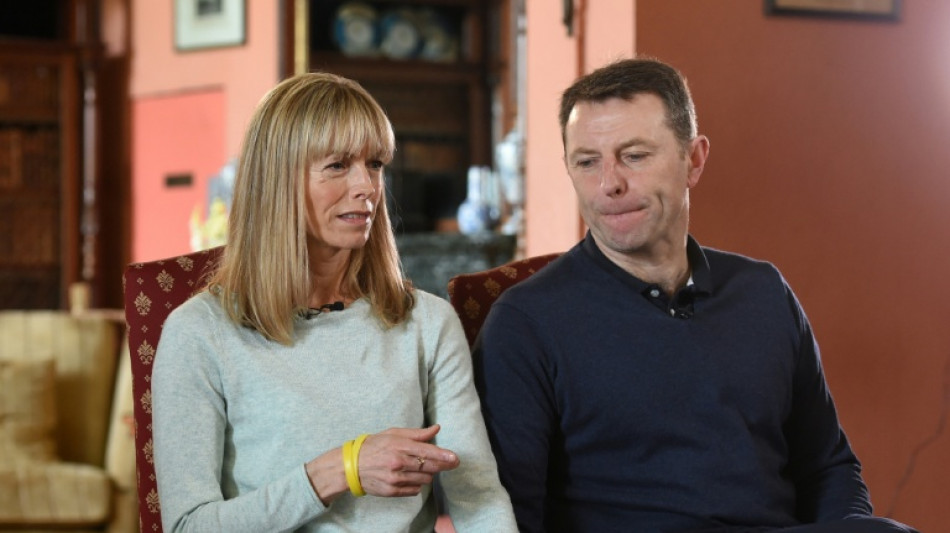

Woman convicted in UK of harassing Maddie McCann's parents
A Polish woman who claimed to be Madeleine McCann, missing for nearly two decades, was Friday convicted by a UK court of harassing the girl's parents, but acquitted of stalking them.
Madeleine was three years old when she vanished in 2007 from the apartment in Portugal where her family was holidaying.
It triggered a massive global search and nearly two decades of unrelenting media attention, but the case remains unsolved.
Julia Wandelt, 24, from Lubin in Poland, began harassing Madeleine's parents in mid-2022. At one point she banged on the door of the family home and on another occasion turned up at a vigil demanding they take DNA tests to prove she was "Maddie".
During a month-long UK trial, both McCann parents and their now grown-up twins made rare public appearances to testify.
The jury, at Leicester Crown Court in central England, found Wandelt guilty of harassment. But the jurors cleared her of the more serious charge of stalking "involving serious alarm and distress" to Kate and Gerry McCann.
Wandelt sobbed just outside the courtroom while awaiting sentencing after hearing the unanimous verdict, the court was told.
Judge Johanna Cutts sentenced her to the maximum term of six months in custody. Wandelt has already served that time in jail awaiting trial, but the judge said a deportation order had also been made against her.
"There was no proper or logical basis for your assertion that you were Madeleine and you should have accepted that," the judge said, calling her actions "unwarranted, unkind and... criminal".
- 'Protection' -
The McCanns said in a statement: "We take no pleasure in the result". They had gone to court, they said, as they "only wanted the harassment to stop".
Cutts also imposed an indefinite restraining order on Wandelt "for the protection of the McCanns", forbidding any contact with them.
The jury cleared co-defendant Karen Spragg, from the Welsh capital Cardiff, of harassment and stalking. She had been accused of helping Wandelt show up at the McCann home and contacting them by phone and in messages.
Cutts nevertheless imposed a five-year restraining order on her.
The McCann parents, both doctors, have borne the brunt of international attention ever since their daughter disappeared.
Kate McCann testified about the distress Wandelt had caused while husband Gerry said her behaviour had become "at times unbearable".
Their other daughter Amelie recounted receiving "creepy" social media messages from her.
Wandelt's lawyer Tom Price had urged jurors to acquit her, arguing she was confused about her parental background.
Giving evidence, Wandelt revealed a troubled background, having previously self-harmed and attempted suicide after she was abused as a child by her step-grandfather.
She told the court a sketch of a suspect in Madeleine's disappearance looked "quite similar" to her abuser and that the suspect shared his surname.
She noted that that had been a "big factor" in her beginning to believe she was the missing girl.
- 'Tried everything' -
Wandelt claimed to have limited childhood memories but that those she did have included being with the McCann family, playing ring-a-ring-a-roses and feeding Madeleine's younger brother Sean.
She insisted she had "tried everything" -- including contacting Interpol, police and missing persons charities -- before contacting the McCanns.
Prosecutors detailed "unequivocal scientific evidence" from a forensic expert showing she does not match Madeleine's DNA profile and that she has no familial link to the McCanns.
Spragg had been accused of aiding her by leaving messages for Kate McCann, sending emails and "confronting" the couple on their driveway.
Spragg's lawyer said his client's sole purpose had been to find out whether Wandelt "might be the missing Madeleine".
The McCann case was thrust back into the spotlight in September after prime suspect Christian Brueckner was released from a German prison after finishing a seven-year jail term for rape.
He has not been charged over Madeleine's disappearance due to a lack of evidence, even though German prosecutors named him as their top suspect in 2020.
B.Ramirez--CT



